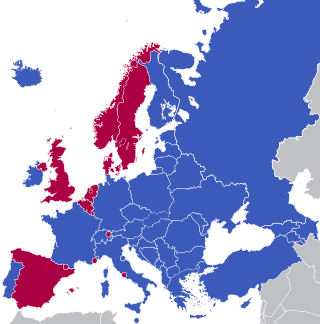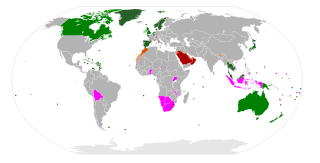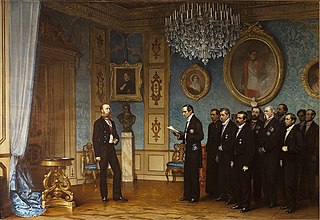A monarchy is a form of government in which a person, the monarch, reigns as head of state for life or until abdication. The extent of the authority of the monarch may vary from restricted and largely symbolic, to fully autocratic, and may have representational, executive, legislative, and judicial functions.
Republicanism in Australia is a movement to change Australia's system of government from a constitutional monarchy to a republic; presumably, a form of parliamentary republic that would replace the monarch of Australia with a non-royal Australian head of state. It is opposed to monarchism in Australia. Republicanism was first espoused in Australia before Federation in 1901. After a period of decline following Federation, the movement again became prominent at the end of the 20th century after successive legal and socio-cultural changes loosened Australia's ties with the United Kingdom.
A royalist supports a particular monarch as head of state for a particular kingdom, or of a particular dynastic claim. In the abstract, this position is royalism. It is distinct from monarchism, which advocates a monarchical system of government, but not necessarily a particular monarch. Most often, the term royalist is applied to a supporter of a current regime or one that has been recently overthrown to form a republic.
The abolition of monarchy is a legislative or revolutionary movement to abolish monarchical elements in government, usually hereditary. The abolition of an absolute monarchy in favour of limited government under a constitutional monarchy is a less radical form of anti-monarchism that has succeeded in some nations that still retain monarchs, such as Sweden, Spain, and Thailand.
Republicanism in the United Kingdom is the political movement that seeks to replace the United Kingdom's monarchy with a republic. Supporters of the movement, called republicans, support alternative forms of governance to a monarchy, such as an elected head of state. Monarchy has been the form of government used in the United Kingdom and its predecessor domains almost exclusively since the Middle Ages, except for a brief interruption in the years 1649–1660, during which a republican government did exist under the leadership of Oliver Cromwell.

Canadian republicanism is a movement for the replacement of the monarchy of Canada and a monarch as head of state with a parliamentary republic and a democratically-selected Canadian as head of state. Republicans are driven by various factors, such as a perception of inequality in the concept of excluding all but members of the royal family from the position or the argument that Canadian independence will not be achieved until Canadians can choose their own head of state independently and democratically.

The Australian republic referendum held on 6 November 1999 was a two-question referendum to amend the Constitution of Australia. The first question asked whether Australia should become a republic, under a bi-partisan appointment model where the president would be appointed by the federal parliament with a two-thirds majority. This was the model that was endorsed by the Constitutional Convention, held in Canberra in February 1998. The second question, generally deemed to be far less important politically, asked whether Australia should alter the Constitution to insert a preamble.

Australians for Constitutional Monarchy (ACM) is a group that aims to preserve Australia's current constitutional monarchy, with Charles III as King of Australia. The group states that it is a non-partisan, not-for-profit organisation whose role is "To preserve, to protect and to defend our heritage: the Australian constitutional system, the role of the Crown in it and our Flag".
David Edward Flint is an Australian legal academic, known for his leadership of Australians for Constitutional Monarchy and for his tenure as head of the Australian Broadcasting Authority.

The Monarchist League of Canada is a Canadian nonprofit monarchist advocacy organization. This league promotes its aims in three areas: education, advocacy, and research. Local branches and many under the patronage of lieutenant governors, complement these areas of focus by acting as a grassroots rallying point for members.

The Australian Monarchist League (AML) is a voluntary association that promotes and advocates for the retention of Australia's constitutional monarchy.The organisation advocated for a "no" vote in the unsuccessful 1999 republic referendum, which asked whether the Australian Constitution should be amended to make Australia a republic.
A process model is, in the context of the republic debate in Australia, a model for the process by which the questions surrounding whether and how Australia should become a republic may be answered. A number of process models have been processed. Proposed process models are a subject of debate within the Republicanism movement. Such debate usually surrounds whether the people should be asked to choose between the current system and a general republican system of government, one specific republican system of government, or multiple alternative republican systems of government.

Canadian monarchism is a movement for raising awareness of Canada's constitutional monarchy among the Canadian public, and advocating for its retention, countering republican and anti-monarchical reform as being generally revisionist, idealistic, and ultimately impracticable. Generally, Canadian monarchism runs counter to anti-monarchist republicanism, but not necessarily to the classical form of republicanism itself, as most monarchists in Canada support the constitutional variety of monarchy, sometimes referred to as a crowned republic. These beliefs can be expressed either individually—generally in academic circles—or through what are known as loyal societies, which include the Monarchist League of Canada, legions, historical groups, ethnic organizations, and sometimes police and scout bodies. Though there may be overlap, this concept should not be confused with royalism, the support of a particular monarch or dynasty; Canadian monarchists may appreciate the monarchy without thinking highly of the monarch. There have also been, from time to time, suggestions in favour of a uniquely Canadian monarch, either one headed by a descendant of the present monarch and resident in Canada or one based on a First Nations royal house.

The monarchy of Australia is a key component of Australia's form of government, by which a hereditary monarch serves as the country's sovereign and head of state. It is a constitutional monarchy, modelled on the Westminster system of parliamentary democracy, while incorporating features unique to the constitution of Australia.
Debate between monarchists and republicans in Canada has been taking place since before the country's Confederation in 1867, though it has rarely been of significance since the rebellions of 1837. Open support for republicanism only came from the Patriotes in the early 19th century, the Red River Métis in 1869, and minor actions by the Fenians in the 19th century. However, paralleling the changes in constitutional law that saw the creation of a distinct Canadian monarchy, the emergence in the 1960s of Quebec nationalism, and the evolution of Canadian nationalism, the cultural role and relevance of the monarchy was altered and was sometimes questioned in certain circles, while continuing to receive support in others.

In the European history, monarchy was the prevalent form of government throughout the Middle Ages, only occasionally competing with communalism, notably in the case of the maritime republics and the Swiss Confederacy.

Scottish republicanism is an ideology based on the belief that Scotland should be a republic; the nation is currently a monarchy as part of the United Kingdom. Republicanism is associated with Scottish nationalism and the Scottish independence movement, but also with British republicanism and the movement for federalism in the United Kingdom.
The Australian head of state dispute is a debate as to who is considered to be the head of state of Australia—the monarch, the governor-general, or both. Both are described in official sources as "head of state" but the Australian constitution does not mention the term. A number of writers, most notably Sir David Smith, have argued that the term is better used to describe the governor-general. The difference of opinion has mainly been discussed in the context of Australia becoming a republic, and was prominently debated in the lead-up to the republic referendum in 1999.

Monarchism is the advocacy of the system of monarchy or monarchical rule. A monarchist is an individual who supports this form of government independently of any specific monarch, whereas one who supports a particular monarch is a royalist. Conversely, the opposition to monarchical rule is referred to as republicanism.

Monarchism in Mexico is the political ideology that defends the establishment, restoration, and preservation of a monarchical form of government in Mexico. Monarchism was a recurring factor in the decades during and after Mexico's struggle for independence.










